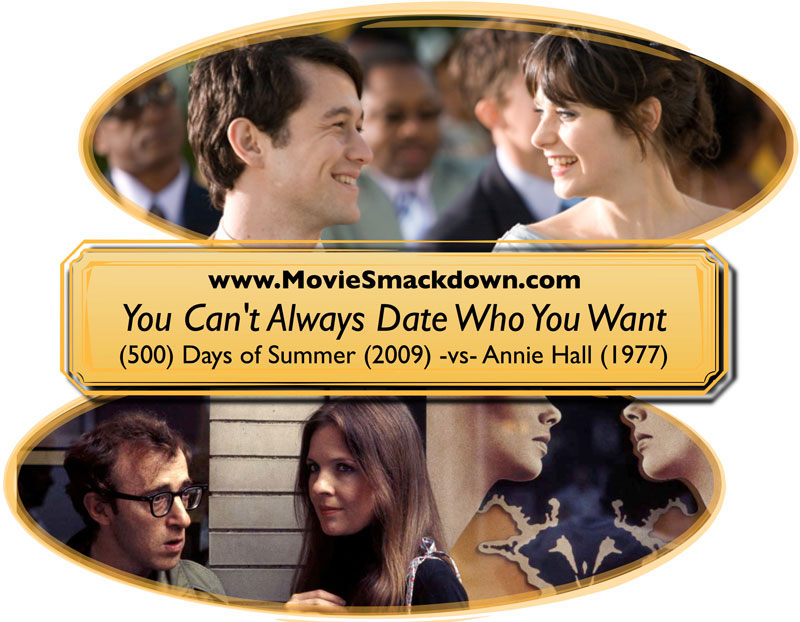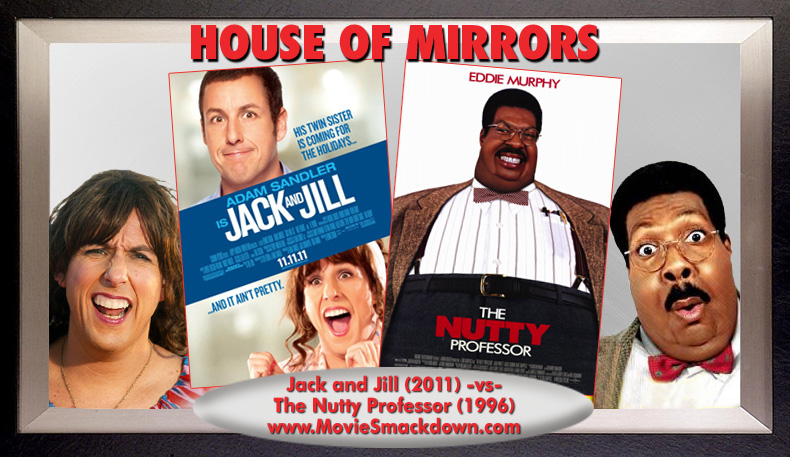
 The Smackdown
The Smackdown
(500) Days of Summer takes many of its cues from a certain New York filmmaker, making it similar to a pivotal movie in the entire rom-com genre, Woody Allen’s Annie Hall. Maybe that’s what got the screenplay nominated this year by the Writers Guild of America.
What unites both films here is their exploration of male feelings. Yes — guy feelings — and not just lust. Both men have a desire to connect with a woman that goes beyond plugging into a sexual electric socket (although both celebrate first plug-ins, as it were), but really these guys want a relationship based also on meeting emotional needs as well as their romantic visions of love.
Here’s the Smackdown question: Has Annie Hall aged well enough to still hold onto its crown, or is it just an aging fighter, great in its day, but no match for the moves of a younger, better-trained opponent? Let’s go to the movies and find-out…
[singlepic id=581 w=320 h=240 float=right]
The Challenger
(500) Days of Summer starts with a disclaimer, explaining that the movie is “not a love story” but rather “a story about love.” The narrator goes on to say that what we are about to see has nothing to do with real characters — except — wink, wink — that it’s kinda, sorta based on a real relationship turned sour with a real woman. Joseph Gordon Levitt, once an alien on NBC’s 3rd Rock from the Sun and then a mentally disabled character in The Lookout, uses his Heath Ledger good looks to put forth a fine performance as the tender-but-tortured Tom, a greeting card writer who can’t help but fall for the porcelain doll of a newcomer to the office, Summer, played with equal parts glassy-eyed appeal and mystery by Zooey Deschanel.
Writers Scott Neudstadter, and Michael H. Weber work to set up the problem that Tom is primed to be swept off his feet by the power of true love, a notion Summer doesn’t believe exists, pitting true believer against atheist. It’s clear that director Marc Webb has thought about how to bring this dramedy to life in a careful, well-observed way. He shows us relationship vignettes out of order, but still in a way to chronicle the rise and fall of Tom and Summer’s dance of intimacy. In fact, now that I say the word dance, I mean that literally.  This indie film breaks with the language and devices it was using up to that point in the story in order to stage an all out Disney-like parade down main street when Tom is able to consummate his emotional feelings physically. There’s even a brief appearance made by an animated blue bird of happiness.
[singlepic id=27 w=320 h=240 float=right]
 The Defending Champion
The Defending Champion
As Oscar followers will tell you, Annie Hall won the 1977 Academy Award against one of the biggest blockbusters ever, Star Wars. It is often considered movie-goers’ favorite Woody Allen movie. People don’t just like it, it makes favorite movie of all time lists. Annie Hall tells a semi-autobiographical story of comedian Alvy Singer (Allen) and his ill-fated romance with an endearing but ditzy woman named Annie Hall (Keaton). Woody Allen’s film remains a breakthrough for the romantic comedy art form.
Earlier, rom-com characters weren’t allowed to have flaws — other blocking characters kept the lovers apart. In this film, as in life, sometimes the biggest impediments to true happiness are our own selves. Â This film draws from Allen’s own existence to introduce us to a person who can’t handle success in his romantic life — who picks apart perfection and turns it into a joke. It illustrates something I truly believe about people — how our best qualities (in Woody’s case his ability to find the funny) can become our worst qualities over time (his inability to enjoy what’s working without punching holes using his punch lines). The plot line is a variation on the norm, boy meets girl, boy gets together with girl, boy loses girl. But there’s no getting her back. That step is futile, setting us up for a bittersweet story.
The Scorecard
For an enjoyable date night, you really can’t go wrong with either movie. Both are a cut above and more complex than the usual cookie cutter versions of how boy and girl should connect. Each one tells a story that is unpredictable and involving.
In (500) Days of Summer, there are definitely two tracks to the characters’ points of view, and the filmmakers use a split screen (like Woody) to especially good effect to point out the fantasy version of events in Tom’s head versus the reality of life that is actually unfolding for him. Okay, it’s a gimmick, but it works. The angst Tom suffers is palpable, but it seems like the “she’s not that into you” vibe that Summer is emitting was concealed unfairly from both Tom and the audience, so much so that it is a cheat later in the plot when she appears to have evolved light years from her original position after just a couple time jumps. And (500) Days of Summer is romantic comedy, written using a hipster dictionary. It tries too hard to be of the moment and puts the feelings of romantic despair out there in a manipulative way. Tom’s miserable so we should care about him, instead of we actually really do like this guy, Tom, and don’t want him to be miserable. Sounds like a subtle distinction, but it makes all the difference. Anytime a “should” is involved, especially when it’s dictating how an audience should feel, a movie gets in trouble.
In either case, a movie can’t just rely on clever devices. At its core, it needs to tell us a truth that engages us. Ironic that both movies use narrators to help us through this journey — only in (500) Days of Summer it’s a voice of God type of thing. Actually the guy sounds like he’s narrating a sex education/ science movie, whereas in Annie Hall, Woody Allen himself decides to tell his own story and sounds like, well, Woody Allen before his narration became a standard in most of his films.
That all said, (500) Days of Summer tried its best to make a movie based on real characters and a real situation, building out from those characters. Â Not like the situation comedies that force us into laughing only at the predicament. And in a weird way, that seems almost daring in our current world of gross, high concept comedies.
On the other hand, Annie Hall is a smart comedy, not only in its intellectual range, but also in its character development. It’s a beautifully written screenplay where characters talk a lot, but the words themselves aren’t saying what the characters are feeling. There’s much deeper communication going on. Annie, herself, is such a uniquely flawed creation, who really gives it a try with Alvy’s ongoing neurosis of the moment. Love can only conquer all when the couple’s individual bad traits can get along. Unfortunately, it’s too great a hill to climb for long term success for Annie and Alvy. So goodbye happy ending. Although, if anything, Annie Hall proves the old saying “it’s better to have loved and lost than to have never loved at all.” It’s certainly more entertaining.
The Decision
(500) Days of Summer may borrow some of Woody Allen’s techniques to cultivate its romantic comedy garden (doesn’t everyone?), but it still has its own satisfying taste and it’s hardly a waste of time. Hardly. Go see it. There are always tasty vegetables here — and you’ll come away feeling more nourished than the normal red vines we eat during most films. Putting this nascent effort up against the Muhammed Ali for rom-coms may be a tad unfair.
If (500) Days of Summer had been made in 1977 instead of 2009, things might be different. Â Instead of breaking new ground in romantic films, it relies on building from and extending out of Allen’s time-tested innovations. But if you want to see Woody Allen at his finest, and take a ride in that crazy Volkswagen bug with Annie Hall while taking about real bugs as big as (soon to be extinct) Buicks, cue up your Netflix — it’ll make you grateful for the ability to stay out of your own romantic way and make you laugh at just how difficult that is!
Here’s the bottom line. Summer makes a great date; she’s fun, energetic and ready with a surprise or two, even if you can’t see the relationship going anywhere. Annie, well, she’s a keeper who you want to go steady with, marry and have kids. The champion remains the great comic fable Annie Hall.




It’s the first time I read it, but finally, someone agrees with me that it’s not that clear why Summer and Tom didn’t work out. I still don’t know! If she didn’t believe in love, why did it end the way it did? In Annie Hall it was much clearer that it didn’t work out, altho I did get some hope in the end when they had lunch.
What!? You mean Cary Grant and Carole Lombard weren’t in those two? Thanks, folks, for a badly needed Monday morning laugh. Hmmm, that might become my new text short-hand. BNMML…
Just to clarify some terms for you: Romeo and Juliet was a Shakespearean tragedy, not a romantic comedy, and Gone With The Wind was an historical romantic epic, not a romantic comedy.
Earlier rom-com characters weren’t allowed to have flaws? Romeo killed a guy. Scarlett O’Hara was so vain and single minded she thought she was in love with the wrong person, and Rhett was a jerk.
Great review, mainly because I agree with you but also because it is so well written…now will you forgive me for not liking ‘Up’?
lex and i are supposed to see 500 days over the weekend it should be a fun debate for us as we both revere “annie” and there is that 30 year mother/daughter age difference and romantic perspective, hmmmmmmm
Yay! More estrogen!
Welcome to the Smack, Jack!